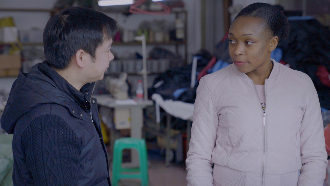
NA China 2020
Distributed by Grasshopper Film, 12 East 32nd St., 4th Floor, New York, NY 10016
Produced by Les Films du Bilboquet
Directed by Marie Voignier
Streaming, 71 mins
High School - General Adult
Documentaries; Economics; Globalization; Language
Date Entered: 01/06/2022
Reviewed by Jennifer Dean, Film Editor, Filmmaker, Film CuratorIn her documentary NA China, filmmaker Marie Voignier explores the garment industry in Guangzhou, once a terminal port in the Silk Road - now a major industrial city and the capital of China’s Guangdong province. She provides a window into the world of market economies, materialism and globalization, raising questions without necessarily being interested in providing concrete details or objective analysis, putting these issues into a larger context. Through verité footage the film follows three African women - Jackie, Julie and Shanny - as they navigate being purchasers for their home countries of clothing produced in China. The audience gets to know the women through their day-to-day business dealings. They have to operate within a system which gives preference to Chinese buyers, even though those buyers may not be as knowledgeable about what the desired goods are for the markets they service in Africa. Those in power are, of course, those who control the mode of production (even in Communist China). The film explores many valuable issues through the mundane moments where the three women simply go about their day engaging with sellers of fabrics, clothing and fabricated hair.
In the only direct to camera interview in the film one of the women provides a fascinating discourse on materialism, originality and the meaning of brand. As she notes, what the Chinese market has done is smart - they reproduce brand name products that have value in the West, creating “copies” of varying quality to be sold. After all, what does “original” mean? Only the first design is an original, each subsequent piece (even those made by the designers themselves) is a replica of the first. Through knock-offs of brand products, the Chinese have managed to create the “impression of Chanel” or of any particular brand to satisfy a worldwide market. Of course, these musings of hers are philosophical not legal. Her analysis provides insight into director Voignier’s abstract approach to the subject, immersing the viewer in the lives of these women without providing frames of reference beyond the scenes themselves. Outside of this one initial to-camera exchange there are no modern documentary constructions such as voice over or on-camera text of any kind, including “lower thirds” of names which traditionally identify the main subjects of the film.
The style is akin to a Maysles brothers' picture or an anthropological work from the early years of documentary filmmaking, where Zora Neale Hurson, Jean Rouch and others (often ethnographers and not necessarily filmmakers) used film technology to capture life and culture as it unfolded, allowing the viewer to experience the world without feeling as though it is being mediated by a filmmaker - although of course it is. There is a scene between one of the main subjects and two other women, engaging with one another about the difficulties of navigating the Chinese legal system, giving voice to the struggles these women face, along with a few other conversations in a car with the same woman. These instances can appear somewhat staged and yet much of the film reveals quiet moments where the camera seems to be invisible.
Given the insights into markets and proliferation of goods illustrated in NA China, the film would be an asset to courses exploring globalization and economics as well as an excellent resource for a documentary class exploring verité film.The seamless use of different languages to communicate by the women in the film could also provide an effective tool to examine culture and linguistics. Recommended.
Awards: Official Selection, Visions du Réel
Published and licensed under the Creative Commons Attribution 4.0 license. Anyone can use these reviews, so long as they comply with the terms of the license.